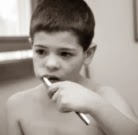How to Encourage Your Kids to Brush
Although tooth decay is not quite as common as it once was, it is still one of the most common diseases among children. While fluoridated drinking water and fluoride containing toothpastes have helped to improve the oral health of both children and adults, regular brushing is still very important to maintaining good oral health.
The key to establishing good brushing habits is starting early. The American Dental Association suggests that you begin cleaning your child's mouth the first few days after birth. Starting early gets your child accustomed to having a clean, plaque-free mouth. It also makes it alot easier to brush their teeth later once they've become accustomed to you fiddling in their mouth. They're also more likely to maintain their oral health once they're used to the feeling of a clean, plaque-free mouth.
After each meal, take a wet washcloth and gently wipe your baby's gums. This will removes any plaque that has accumulated on their gums. Removing plaque will also help prevent bacteria from building up on their gums.
Their First Teeth
Starting around 6 months, your child will begin teething; you may notice an increase in salivation and irritability.
As soon as their first teeth start to appear, use a cotton swab or piece of gauze wrapped around the finger to gently wipe their teeth and gums each day. Continue this method of cleaning after each feeding until the infant is approximately 12 months of age; at which point a toothbrush (soft bristles with a small head) can be introduced.
Let’s Start Brushing and Flossing
They may scream, they may protest, they may resist... but you must persevere! It's extremely important that you find a way (anyway) to get them brush and floss their teeth. Children usually lack the manual dexterity to effectively brush until the ages of 5 or 6. Until that time, parents are relegated the role of prison warden in making sure their teeth are clean (clean enough to eat off of). Unfortunately, baby teeth are less resistant to decay; they decay much faster than permanent teeth. Brushing your child's teeth will help ensure that decay-causing bacteria and plaque are not left to damage their teeth. By brushing their teeth, you're getting them into a good habit; a habit which will hopefully last a lifetime.
Current literature supports the use of low fluoride toothpaste for children under age seven. Just a pea-size amount should be used. Encourage your children to spit the toothpaste out and not swallow it.
The recommended brushing method is the scrub technique. The brush should be placed at the junction of the gums and the teeth. The chewing surfaces can be scrubbed. This is often the surface which is easiest for children to do on their own. Parents should brush the child’s teeth or supervise brushing until they are sure the child can brush on their own thoroughly.
